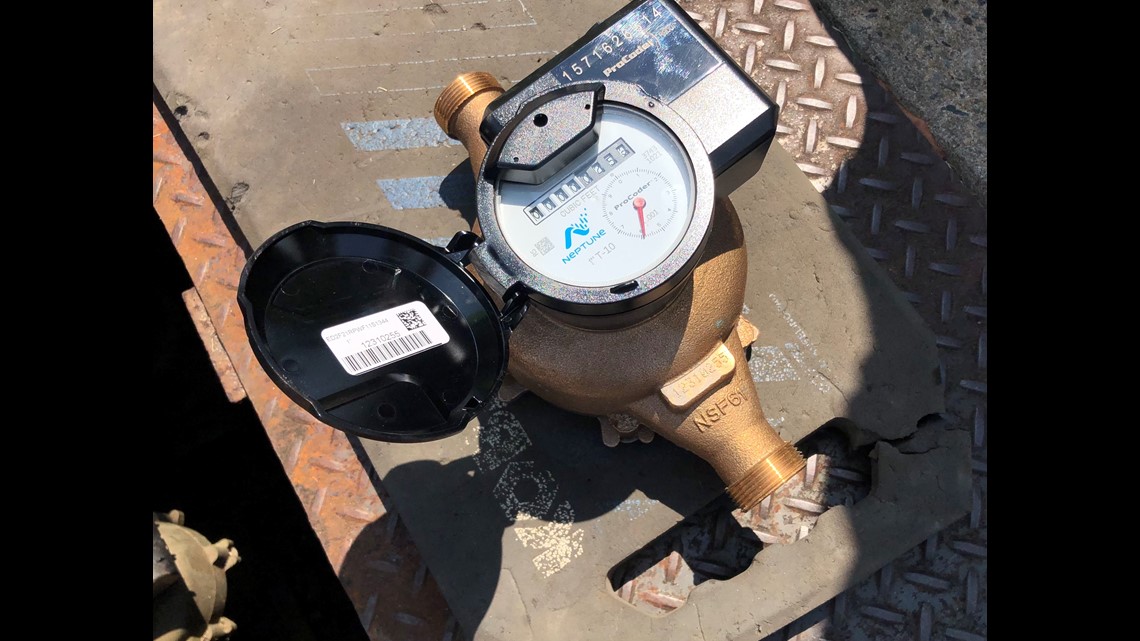MACON, Ga. — Some customers of the Macon Water Authority are decrying increases in their water bills but leaks and increased usage are not to blame.
Summer traditionally brings higher water bills with folks keeping lawns green or filling swimming pools, but some Bibb Countians could be paying more without using any additional water.
As crews replace aging meters and upgrade to Automatic Meter Reading, or AMR, the system is more accurate and customers are being billed for the water they are actually using, say MWA staff.
At the Authority’s August meeting, Macon-Bibb County Commissioner Valerie Wynn, one of two county representatives on the board, said she has seen multiple complaints on social media about high bills in recent months.
Darryl Macy, MWA’s director of sewer conveyance and water distribution, said the new meters are functioning properly and accurately measuring and recording all the water going to a home.
The mechanical meter relies on water flowing through it to turn a built-in device. Each spin translates to a specific amount of water running through the meter and is calibrated to turn the dial that displays how many cubic feet are used.
Many of the older meters were past the end of their 10-year life cycle with wear and tear that meant they were no longer accurate, Macy said.
“It’s not picking up the exact reading. Should be picking up water going through it. It could be spinning and sticking, spinning and sticking,” he said.
Over the past 30 months, MWA began replacing 45,000 of its small meters through a $9.3 million loan from the Georgia Environmental Finance Authority. Last fall, the authority hired ENVOCORE to install 33,000 of the Neptune meters for primarily residential and small commercial accounts.
“We’re doing it to be more accurate. It wasn’t a thing to get more money from people. It you look at it that way, you say, ‘Well, look how many years you were getting free water and not paying for all you were using,’” Macy said. “We’re just trying to get the best system in the ground that we can with the latest technology.”
The new AMR system includes technology that allows drive-by meter reading instead of a worker parking the truck, getting out, lifting the meter cover and documenting the reading.
Contractors have installed nearly three-quarters of the small meters and are expected to finish up in the next couple of months.
What meter installation entails
On a dangerously hot August day, ENVOCARE’s Colby Barnes reached into the ground in front of MWA’s headquarters on Second Street to turn off the water, remove a dingy, dirty old brass water meter and replace it with a shiny new one.
At each site, once Barnes completes the 20-30 minute replacement process he leaves a door tag alerting the property owner that the water was temporarily shut off so that the old water meter could be replaced.
ENVOCORE’s Curtis Heredia said crews will knock on every door before turning off the water to change the meter.
“Mostly 90% of the time nobody answers. Daytime, everybody’s working, hopefully, or sleeping. If we come across a meter that’s running, we won’t change it because, just in case they’re in the shower we don’t want to turn the water off. Nobody wants that,” Heredia said.


After installation, customers might notice a temporary change in water pressure, or air in the pipes when they turn on the faucet.
The only difference in the newer model is in the black register head attached to the meter and a silver disc adhered to the meter cover. That 4-inch circle serves as the antenna transmitting the data on a specific frequency to radio receivers traveling with the roving meter reader.
A few years ago, MWA crews upgraded 1,600 meters around Lake Wildwood as kind of a test project.
After the first billing cycle on the automated system, no issues were reported during the Finance Committee’s report in March of 2022.
The AMRs gave the Authority the efficiency it was looking for in reading meters. Instead of stopping at every house, the radio receiver in the truck can pick up all of Lake Wildwood by driving down Interstate 475.
“Where it took 10 hours a day to get through it and now it only takes a drive-by 10 seconds,” Macy said.
The Authority is now considering moving to more advanced AMI technology, which stands for Advance Metering Infrastructure.
AMI eliminates the need to physically visit the meters or even drive-by.
Instead, the system automatically sends data to the utility at regular intervals through software that also allows customers to monitor their water usage.
“You just punch a button in the building, and it gives you the readings from all over town. And the customers can look at their readings any time. Every hour they’re downloaded so anytime they can look at their meter and go, ‘I used one, or I used two today. How come I used four today?’ and look for a leaking toilet. They can log on and see everything they need to know,” Macy said of the more advanced AMI system under consideration.
All of the new meters currently going in have a leak detector that can be viewed by lifting the flap on the register head attached to the meter.
“These ones actually have got a little symbol on them that’ll tell you if it detects a leak,” Heredia said. “These ones that we’re putting in, it’s got this red dial that will continually spin if there’s water consumption.”
If the small dial is spinning and there’s no water being used, the property owner should search for a leak.
Since the meter reading technology automatically transfers data to a central data base for billing, it reduces the risk of human error in recording the readings.
Customer care workers can also track usage and detect anomalies in the billing cycles.
How to check for leaks
College Street resident Greg Fischer is skeptical of the new technology as it hasn’t stopped his erratic water usage.
For no apparent reason, his water bill spiked a few years ago at his 1890 Victorian home. After consulting with the Water Authority, a supervisor came to his home and said it must be a leaking toilet as there was no other obvious leak, Fischer recalled recently.
Although he doubted his toilet could be leaking that much, he replaced it.
In fall of 2021, when Fischer’s bill nearly tripled over two months in 2021.
“There’s no way I could ever have gotten to that amount without just massive flooding at my house,” Fischer said.
MWA installed a smart meter later that year.
“Somewhere in there they put the new meter in, and I actually went back and told them I wanted it removed because I had less confidence now because it was fluctuating all over the place,” Fischer said.
He read multiple news articles from across the county challenging the reliability of smart meters, but the water professionals insist they are more accurate and can better detect spikes.
Fischer’s troubles began before AMR was installed, and he has yet to identify what is causing his bill to vacillate.
Macy said the pending AMI technology will help customers like Fischer better track those fluctuations themselves on a day-to-day, hour-by-hour basis to help pinpoint where the water is going.
With the AMR system Fischer has, customer service representatives can only notice spikes during monthly billing.
“If something’s going on, we’ll report to the customer you may want to check on your side. We’ll leave notices on their door,” Macy said.
Generally, if a family of four exceeds 12,000 gallons of use per month, a leak is likely.
MWA advises checking the meter before and after a two-hour period when no water is being used. If the meter register changes, water is running somewhere.
To check for a leak in a toilet, add a drop of food color to the tank. If after 10 minutes the color has leaked into the bowl, there’s a leak. Be sure to flush the toilet promptly after the test to keep the dye from staining the bowl.
Homeowners should also check for leaks in the underground irrigation system and garden hoses.
MWA Executive Director Ron Shipman said your lawn could be a good indicator of a leak.
“If you have a patch of grass that’s more green, you may want to think about looking for leaks there. Obviously, if you’re seeing increased water usage and you’re not using that water realistically, that could be another sign you may have a leak,” Shipman said during taping of last month’s Central Georgia Focus.
Water Authority Chairman Gary Bechtel said it’s their job to make sure people are billed accurately and leaks are diminished.
The Authority is currently exploring using AMI for the remaining 23,000 meters to be changed out, and in all future installations and replacements when the new meters reach the end of their life cycle.
“AMI is just a better technology and it reads off a web that is set up. We’re trying to make a decision now which particular network we’ll utilize for that, so that’s forthcoming,” Bechtel said.
Anyone with questions about the new meters or billing should call 478-464-5600.
– Civic Journalism Senior Fellow Liz Fabian covers Macon-Bibb County government entities and can be reached at fabian_lj@mercer.edu.

